| Opel Mokka | |
|---|---|
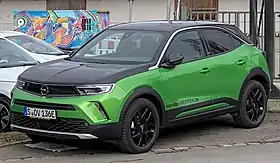 | |
| Overview | |
| Manufacturer | Opel |
| Production | 2012–present |
| Body and chassis | |
| Class | Subcompact crossover SUV (B) |
| Body style | 5-door SUV |
The Opel Mokka is a subcompact crossover SUV that has been produced by German automaker Opel since 2012. Sales began with the model year of 2013, at the end of 2012.[1] The first generation was developed by GM Korea as the U200 Chevrolet Trax. The facelifted Opel Mokka was marketed as the Mokka X, before reverting to Mokka for the second generation. It is also sold under the Vauxhall brand in the United Kingdom. The Buick Encore sold in North America and in China was also derived from the Trax but the lines diverged after Opel became part of Stellantis.
The second generation Mokka was launched in 2020 after a brief hiatus. It marked the switch to PSA platform, after the acquisition of Opel and Vauxhall brands in 2017.
First generation (J13; 2012)
| Opel Mokka A (J13) | |
|---|---|
 | |
| Overview | |
| Manufacturer | Opel (General Motors) |
| Also called |
|
| Production |
|
| Model years |
|
| Assembly | |
| Designer | |
| Body and chassis | |
| Layout | Front-engine, front-wheel drive/four-wheel-drive |
| Platform | GM Gamma II platform |
| Related | Chevrolet Trax[5] |
| Powertrain | |
| Engine | |
| Transmission | |
| Dimensions | |
| Wheelbase | 2,555 mm (100.6 in) |
| Length | 4,280 mm (168.5 in) |
| Width | 1,775 mm (69.9 in) |
| Height | 1,646 mm (64.8 in) |
| Kerb weight |
|
The Mokka was positioned below the Antara and the Zafira Tourer in the Opel line-up, and was available in both front wheel and four wheel drive versions. The Mokka name derives from the small, round coffee beans of the Coffea Arabica variety. The Mokka A is based on GM's Gamma II platform.
The four wheel drive option was an intelligent AWD system that maintains 100% drive at the front wheels until the system detects slip, fast starts or tight cornering, in which case it can send up to 50% of torque to the rear wheels.[6]
Production and sales started in autumn of 2012. By February 2013, Opel had over 80,000 Mokka orders, and after two months 100,000 orders. By October 2014, over 300,000 Mokkas were ordered in Europe. In January 2016, Opel announced 500,000 firm orders for Mokka overall.[7]
In 2019, Opel ceased production of the first generation Mokka as part of Opel/Vauxhall's full switch to Groupe PSA car platforms. The vehicle is still sold under the Buick marque.
The Mokka (and Encore) are derived from the Chevrolet/Holden Trax, but are given their own sheet metal and trim.[5]
.jpg.webp) Opel Mokka (pre-facelift)
Opel Mokka (pre-facelift) Interior (pre-facelift)
Interior (pre-facelift) Vauxhall Mokka
Vauxhall Mokka
Facelift
In April 2016, Opel and Vauxhall unveiled an updated version of the Mokka for the model year of 2017, designated as the Mokka X, which went on sale in the end of 2016. The new Mokka X sports a facelift with sleeker headlights, restyled bumpers, new LED tail lights, and a revised interior with an all new dash, instrument cluster, and center stack. The more powerful optional 152 PS (112 kW; 150 hp) petrol engine was also introduced with the Mokka X.[8][9]
_%E2%80%93_Frontansicht%252C_23._Dezember_2016%252C_D%C3%BCsseldorf.jpg.webp) Opel Mokka X (facelift)
Opel Mokka X (facelift)_%E2%80%93_Heckansicht%252C_23._Dezember_2016%252C_D%C3%BCsseldorf.jpg.webp) Opel Mokka X (facelift)
Opel Mokka X (facelift) Vauxhall Mokka X (facelift)
Vauxhall Mokka X (facelift)_%E2%80%93_Innenraum%252C_23._Dezember_2016%252C_D%C3%BCsseldorf.jpg.webp) Interior (facelift)
Interior (facelift)
Mokka by Bitter
Bitter has been producing a luxury version of the Mokka since 2016. Facelifted in the end of 2016 along with the Vauxhall and Opel models, the name was also changed to Mokka X.[10] The differences between the Bitter and Opel versions are mainly cosmetic.[11]
Engines
As introduced in 2012, the Mokka was offered with a choice of three engines: a 115 PS (85 kW; 113 bhp) 1.6-litre petrol, a 140 PS (103 kW; 138 bhp) 1.4-litre turbo petrol, and a 130 PS (96 kW; 128 hp) 1.7-litre diesel.[12][13]
Other petrol and diesel engines were offered later, including a 152 PS (112 kW; 150 bhp) 1.4-litre direct injection turbo petrol engine with a controversial start/stop feature introduced for model year 2016.
Most engines are paired standard with the 5-speed (1.6-litre MPI petrol engine only) or 6-speed manual transmission, with stop/start engine technology beginning as early as model year 2014. A six speed automatic transmission having active select mode is optionally available for select petrol and diesel engines including the 1.4-litre MPI Turbo petrol and 1.7-litre CDTI diesel engines for both FWD and AWD models.
Start/Stop technology on vehicles with automatic transmissions first appeared with the introduction of the new, more powerful (112 kW; 150 hp), B14XFT 1.4-litre direct injection (DI) VVT Turbo petrol engine for model year 2016 and was incorporated on other select petrol and diesel engines paired with automatic transmissions by model year 2018.
In the market in Russia, a version with a 1.8-litre A18XER (Korean designation F18DA) petrol engine is available. The cars for the Russian market were assembled by Avtotor (Kaliningrad, Russia) and later by Unison (Minsk, Belarus) in 2015.[14] In October 2014, for the model year of 2015, Opel introduced its all new "whisper diesel" 1.6-litre CDTI engine which replaced the 1.7-litre CDTI diesel. The engine specifications in the following tables is from the 2013, 2015, and 2018 Opel owner manual.[15][16][17]
| Petrol engines | |||||||
|---|---|---|---|---|---|---|---|
| Model | Engine | Displacement | Power | Torque | Engine ID Code | CO2 emission (g/km) | Years |
| 1.4L VVT MPI Turbo | I4 | 1364 cc | 140 PS (103 kW; 138 hp) at 4900–6000 rpm | 200 N⋅m (148 lb⋅ft) at 1850–4900 rpm | A14NET B14NET | 153 | 2013–2019 |
| 1.4L VVT DI Turbo | 1399 cc | 152 PS (112 kW; 150 hp) at 4900–6000 rpm | 235 N⋅m (173 lb⋅ft) at 1850–4900 rpm | B14XFT | 155 | 2016–2019 | |
| 1.6L VVT MPI | 1598 cc | 115 PS (85 kW; 113 hp) at 6200 rpm | 155 N⋅m (114 lb⋅ft) at 4000 rpm | A16XER B16XER | 139 | 2013–2019 | |
| 1.8L VVT MPI | 1796 cc | 140 PS (103 kW; 138 hp) at 6200 rpm | 178 N⋅m (131 lb⋅ft) at 3800 rpm | A18XER | 225 (FWD, MT5), 257 (AWD, AT6) | 2013–2019 | |
| Diesel engines | |||||||
|---|---|---|---|---|---|---|---|
| Model | Engine | Displacement | Power | Torque | Engine ID Code | CO2 emission (g/km) | Years |
| 1.6L CDTI ecoFLEX | I4 | 1598 cc | 110 PS (81 kW; 108 hp) at 4000 rpm | 300 N⋅m (221 lb⋅ft) at 2000–2250 rpm | B16DTN B16DTU | 114–109 | 2015–2019 |
| 1.6L CDTI Turbo ecoFLEX | 1598 cc | 136 PS (100 kW; 134 hp) at 3500–4000 rpm | 320 N⋅m (236 lb⋅ft) at 2000–2250 rpm | B16DTH | 109–119 | 2015–2019 | |
| 1.7L CDTI ecoFLEX | 1686 cc | 130 PS (96 kW; 128 hp) at 4000 rpm | 300 N⋅m (221 lb⋅ft) at 2000–2500 rpm | A17DTS | 120–129 | 2013–2015 | |
Engine code prefix B indicates Start/Stop technology. B14NET is also available for LPG.
Second generation (2021)
| Opel Mokka B | |
|---|---|
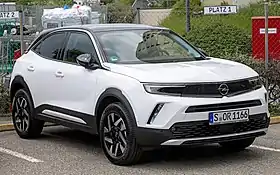 | |
| Overview | |
| Manufacturer | Opel (Stellantis) |
| Also called | Vauxhall Mokka (United Kingdom) |
| Production | 2021–present |
| Assembly | France: Poissy (Poissy Plant)[18] |
| Body and chassis | |
| Platform | PSA CMP (EMP1) platform |
| Related | |
| Powertrain | |
| Engine |
|
| Electric motor | Permanent Magnet Synchronous Motor (Mokka-e) |
| Transmission |
|
| Battery | 50 kWh lithium-ion |
| Electric range | 322 km (200 mi) (WLTP) |
| Dimensions | |
| Wheelbase | 2,557 mm (100.7 in) |
| Length | 4,151 mm (163.4 in) |
| Width | 1,791 mm (70.5 in) |
| Height | 1,531 mm (60.3 in) |
| Kerb weight | 1,195–1,220 kg (2,634.5–2,689.6 lb) |
The second-generation Mokka (B) was announced in August 2018 by the show car Opel GT X Experimental concept, and unveiled on 24 June 2020.[19] Now based on the ex-PSA Group's Common Modular Platform (CMP), the car is available with an electric version dubbed as the Mokka-e.[20]
The ICE version was unveiled on 2 September 2020. Sales of the second-generation Mokka began with the model year of 2021, on 23 December 2020. The production model assembly started in January 2021.[21] There are three engine options, including a 1.2-liter turbocharged three-cylinder petrol rated at 100 PS (74 kW; 99 bhp) and 205 N⋅m (151 lb⋅ft) of torque with a 6-speed manual transmission and a 1.2-liter turbo making 130 PS (96 kW; 128 bhp) and 230 N⋅m (170 lb⋅ft) of torque in combination with a standard 6-speed manual or 8-speed automatic transmissions. While the only diesel engine on offer is a 1.5-liter four-cylinder rated at 110 PS (81 kW; 108 bhp) and 250 N⋅m (184 lb⋅ft) of torque, offered exclusively with a 6-speed manual transmission.[22]
 Opel GT X Experimental
Opel GT X Experimental Opel GT X Experimental
Opel GT X Experimental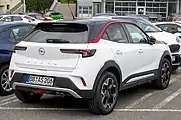 Opel Mokka GS Line (rear view)
Opel Mokka GS Line (rear view) Interior
Interior
Safety
Euro NCAP
The Mokka in its standard European market configuration received 4 stars from Euro NCAP in 2021.[23]
Mokka-e
The Mokka-e, the all-electric version of the Mokka, is powered by a 50 kWh lithium-ion battery with a WLTP range of 322 km (200 mi). Three driving modes are available, Sport, Eco and Normal.[24]
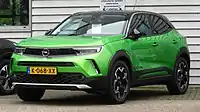 Opel Mokka-e
Opel Mokka-e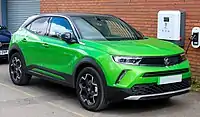 Vauxhall Mokka-e
Vauxhall Mokka-e Battery configuration
Battery configuration
Awards
In June 2022, the Mokka-e won Auto Trader UK's New Car Award for the Erin Baker Award.[25] Auto Trader awarded the Mokka-e four stars out of five in its review of the car.[26]
Sales
| Year | Europe[lower-roman 1][27] | Turkey | Total Production |
|---|---|---|---|
| 2012 | 5,475 | ||
| 2013 | 70,768 | ||
| 2014 | 127,437 | ||
| 2015 | 163,246 | ||
| 2016 | 164,340 | ||
| 2017 | 169,886 | ||
| 2018 | 120,537 | ||
| 2019 | 79,693 | ||
| 2020 | 136 | ||
| 2021 | 70,313 | 82,277[28] | |
| 2022 | 6,540[29] | 100,937[30] |
- ↑ Europe: 2020 EU 27 + UK + Switzerland + Norway + Iceland
References
- ↑ "2013 Vauxhall-Mokka". WorldCarFans. January 2012. Retrieved 10 January 2012.
- ↑ "Opel Mokka rolls off the production line in Zaragoza Archived 2017-02-17 at the Wayback Machine". Opel. 12 September 2014.
- ↑ "Kompakte Maße, großer Auftritt". Vauxhall-Blog. 9 February 2012. Archived from the original on 22 July 2014. Retrieved 14 July 2012.
- ↑ US D848314, Haegen, Marc van der, "Vehicle, toy replica, and/or other replica", published 2019-05-14, assigned to GM Global Technology Operations LLC
- 1 2 "New Chevrolet Trax Small Crossover is the Buick Encore's Global Twin, will Debut in Paris – Carscoop". Carscoop.blogspot.com. 14 May 2012. Archived from the original on 24 July 2012. Retrieved 14 July 2012.
- ↑ Cropley, Steve (25 May 2012). "Vauxhall Mokka 1.4T 4x4". Autocar. Retrieved 24 June 2012.
- ↑ "Opel Mokka Reaches 500,000 Orders". media.opel.com. 11 January 2016. Retrieved 11 January 2016.
- ↑ "2016 Opel Mokka X". NiceCarsInfo. 1 April 2016. Archived from the original on 22 December 2017.
- ↑ Burrow, Matthew (26 February 2016). "Vauxhall Mokka X – all you need to know". WhatCar?. Haymarket Automotive.
- ↑ "Historie" (in German). 1 January 2018. Retrieved 1 January 2017.
- ↑ "Mokka X by BITTER" (in German). 1 January 2018. Retrieved 1 January 2017.
- ↑ "All-New Opel Mokka: Compact in Size, Big in Attitude". Media: Europe. Adam Opel AG. 10 January 2012. Archived from the original on 28 March 2012. Retrieved 16 May 2012.
- ↑ Hudson, Paul (11 January 2012). "Vauxhall Mokka SUV breaks cover". The Telegraph. London. Retrieved 13 February 2012.
- ↑ "Opel Mokka". Wroom.ru.
- ↑ Engine Data, 2013 Opel Owner's Manual, p. 195
- ↑ Engine Data, 2015 Opel Owner's Manual, p. 205
- ↑ Engine Data, 2018 Opel Owner's Manual, Engine Data, pp. 227,228
- ↑ "PSA to Produce All-New 2020 Opel Mokka X in France, Confirms EV Variant". 23 February 2019.
- ↑ "Opel And Vauxhall Debut 2021 Mokka in All-Electric Guise With 200-Mile Range". Carscoops. 24 June 2020. Retrieved 24 June 2020.
- ↑ Padeanu, Adrian. "2021 Opel Mokka Revealed As EV With Sharp Looks, Massive Changes". Motor1.com. Retrieved 24 June 2020.
- ↑ "L'usine PSA mise sur le lancement de l'Opel Mokka". Yvelines Infos (in French). 4 February 2021. Retrieved 21 July 2023.
- ↑ Mihalascu, Dan (2 September 2020). "Opel And Vauxhall Reveal 2021 Mokka's ICE Lineup, Sporty GS Line / SRi Trim". Carscoops. Retrieved 3 September 2020.
- ↑ "Official Opel/Vauxhall Mokka 2021 safety rating". www.euroncap.com.
- ↑ "Opel Mokka-e (2021)". NetCarShow.com.
- ↑ "Erin Baker Award 2022 - Vauxhall Mokka-E". www.autotrader.co.uk. Retrieved 4 November 2022.
- ↑ "Vauxhall Mokka-e Review 2022". www.autotrader.co.uk. Retrieved 4 November 2022.
- ↑ "Opel / Vauxhall Mokka European sales figures". carsalesbase.com. 29 January 2014. Retrieved 26 October 2020.
- ↑ Gaudy, Géraldine (26 January 2022). "Top 15 des voitures les plus produites en France". L'Argus.
- ↑ "2022'de satılan her 100 otomobilin 28'i Bursalı - Emre Özpeynirci". Bursada Bugün. Retrieved 11 January 2023.
- ↑ "Le top 20 des voitures les plus produites en France en 2022". www.largus.fr. Retrieved 21 July 2023.